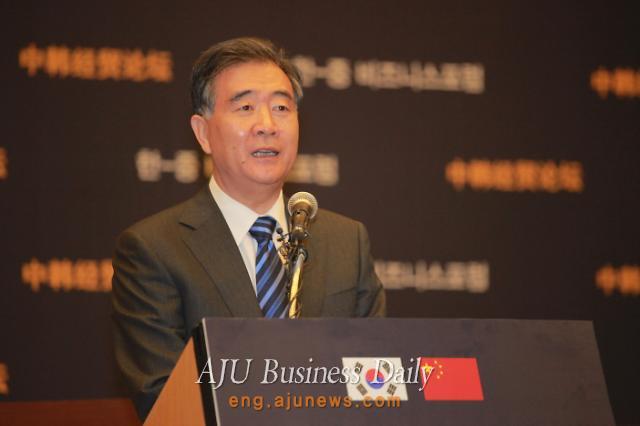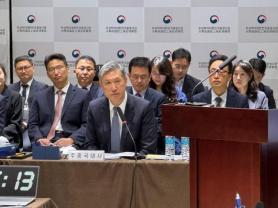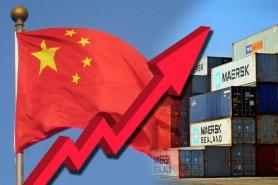
Wan Yang, the Vice Premier of China [Aju News DB]
Chinese Vice Premier Wang Yang has assured the United States that Beijing remained capable of stabilizing the yuan despite global anxiety over its shifting and opaque exchange rate policies.
The official Xinhua news agency reported late Wednesday that Wang told U.S. Treasury Secretary Jack Lew in a phone call Tuesday evening that China remained capable of keeping the exchange rate of China's yuan, also known as the renminbi, "basically stable at a reasonable and balanced level.”
In the phone call, Lew reiterated to China the importance of transitioning to a market-determined exchange rate in an orderly and transparent way, the Treasury said on Wednesday.
Lew also urged Beijing to clearly communicate its exchange rate policies and actions to financial markets, the Treasury said in a statement.
G20 finance ministers and central bank governors will meet this week in Shanghai, at which current market turmoil and a global economic slowdown are expected to be key topics of discussion.
China is expected to try to use the occasion to assuage global anxiety about its currency policies, tumultuous markets and economic management, analysts say.
Chinese officials have repeatedly said Beijing won’t engage in competitive currency devaluation to help the country’s exports and that it remains committed to reforms to open its financial system further. But the market remains skeptical.
Quoting finance minister Lou Jiwei, the official China Daily reported on Thursday a proposal to devalue China's yuan is not on the agenda for meeting of policymakers from the Group of 20 biggest economies in Shanghai on Feb. 26-27
Vice finance minister, Zhu Guangyao, said Thursday China is aware of the spill-over effects of its policymaking in other countries and would be transparent when communicating with the market.
"We do recognise the risk the global economy faces," Zhu said, speaking at a conference held by the Institute of International Finance (IIF) linked to the G20 summit.
"As the second largest economy, we understand our policies have a spill-over effect - that's a fact.
"This is why we have good communication and good policy coordination...we also understand how important it is to correctly communicate with the market," he said, adding that the U.S. should also be aware of such effects when deciding on its own policies.
Zhu said China will promote reforms to make the rate more market-driven and maintain its "managed float" of the currency to achieve exchange rate stability.
China’s opaque currency policies have become a key source of uncertainty for foreign investors and central banks around the world after several bouts of yuan depreciation and heavy intervention triggered global market turbulence in recent months.
In addition, steep falls in Chinese shares growing volatility in China’s capital markets have added to concerns that Beijing is losing control over the economy and may devalue the currency significantly to get growth back on track.
But the chairman of Industrial and Commercial Bank of China (ICBC), the county’s biggest bank by assets, said on Thursday there was no basis for continued depreciation of China's yuan, echoing previous remarks by central bank governor Zhou Xiaocuan.
"China's current account balance situation is good, and there is no basis for continued renminbi depreciation," ICBC's Jiang Jianqing told a business forum in Shanghai.
But many traders believe the yuan will remain under downward pressure as long as economic growth continues to cool.
Chinese exports and the yuan face strong pressure from a complex global environment, the Ministry of Industry and Information Technology said Thursday.
China's economy is facing increasing downward pressure, the ministry said in a statement accompanying a press conference
By Alex Lee
아주경제 박세진 기자 = swatchsjp@ajunews.com
Copyright ⓒ Aju Press All rights reserved.




